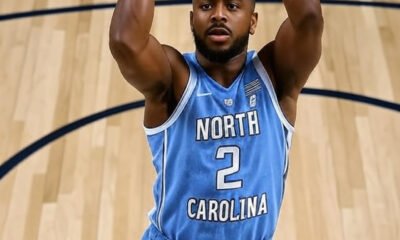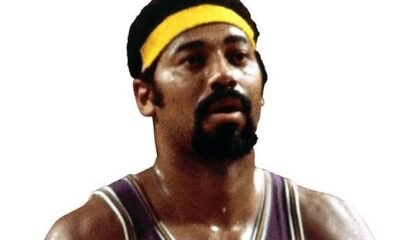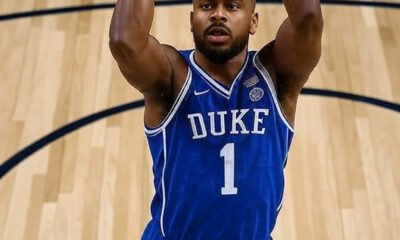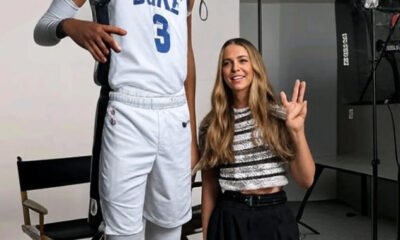Blog
Breaking: Florida Gators football Announces Plans to Launch Second Basketball Team Aside from the Gators, Sparking Excitement and Surprise
Breaking News: Florida Gators Football Announces Plans to Launch a Second Basketball Team, Sparking Excitement and Surprise Across the College Sports World
In an unprecedented move that has sent shockwaves through the college athletics community, the University of Florida Gators has announced plans to establish a second men’s basketball team in addition to its already prominent basketball program. This bold initiative, announced by university officials during a press conference yesterday, aims to revolutionize collegiate basketball at Florida and generate buzz both nationally and locally.
—
### The Unveiling of a Controversial and Ambitious Initiative
The University of Florida’s athletic department revealed that the decision to launch a second men’s basketball team is part of an aggressive strategy to enhance the university’s athletic profile, increase recruitment opportunities, and capitalize on the sport’s growing popularity.
“We are excited to announce the formation of a new men’s basketball program,” said UF Athletic Director Scott Stricklin. “This is a historic move that positions Florida at the forefront of college basketball innovation. Our goal is to develop a competitive team that can compete at the highest levels and bring new excitement to our campus and supporters.”
This announcement has surprised many fans, analysts, and even rival institutions, as few universities have attempted to operate multiple teams in the same sport at the NCAA level. The move raises numerous questions about logistics, compliance, and the broader impact on college athletics.
—
### The Rationale Behind Launching a Second Basketball Team
**Strategic Growth and Competitive Edge**
Florida’s athletic department believes that having two men’s basketball teams will open new pathways for talent development. With a burgeoning local talent pool and an increasing number of high school prospects, the university aims to create a pipeline that can bolster the competitiveness of both programs.
**Increased Revenue and Brand Expansion**
Basketball is one of the most popular college sports in the United States, with a dedicated fan base and lucrative television contracts. By fielding two teams, Florida expects to generate additional revenue through ticket sales, merchandise, and media rights. Moreover, this move aligns with the university’s broader branding strategies to elevate its profile nationally.
**Innovative Approach to Collegiate Sports**
While controversial, the initiative reflects a willingness to innovate within the NCAA framework. It echoes earlier efforts by some universities to experiment with sports programs, but the scale and ambition here are unprecedented.
—
### Operational and Logistical Considerations
**Compliance with NCAA Regulations**
One of the first questions raised concerns NCAA rules, which typically prohibit multiple teams in the same sport from competing within the same athletic conference or in the same division. The university has reportedly been in secret consultations with NCAA officials to navigate potential regulatory hurdles.
**Scheduling and Conference Alignment**
The university plans to designate the existing team as the “Gators,” competing at the NCAA Division I level, while the second team will participate in an independent league or a newly created conference. This approach aims to avoid direct intra-squad competition and compliance issues.
**Facilities and Resources**
To support two teams, UF is investing heavily in facilities, including renovations of the O’Connell Center, expanding practice gyms, and hiring additional coaching staff. The university emphasizes that the second team will have dedicated resources, including scholarships, training staff, and travel arrangements.
**Player Recruitment and Eligibility**
The new team will primarily focus on recruiting younger prospects, including high school seniors and transfer students, offering unique opportunities for athletes to develop and compete at different levels. The university plans to implement a dual-path development system, with the possibility of players transitioning between teams.
—
### The Broader Impact on College Basketball
**Implications for NCAA Structure**
This move could set a precedent for other institutions seeking to maximize their basketball programs. If successful, it may prompt discussions about NCAA regulations, eligibility, and the structure of collegiate sports.
**Potential for a “Farm System” or Development League**
Some analysts speculate that the second team could serve as a developmental platform—akin to a farm team—allowing younger players to gain experience before moving up to the main squad. This model could influence how college basketball programs are built and operated.
**Fan Engagement and Media Attention**
The novelty of two Florida Gators teams competing at different levels or in separate leagues is likely to attract heightened media interest. Fans could witness more games, rivalries, and storylines, increasing the sport’s visibility on campus and beyond.
—
### Reactions from the College Sports Community
**Supporters’ Perspectives**
Many fans and alumni are thrilled by the boldness of the move. “This is a game-changer,” said UF alumnus and former player Marcus Lee. “It shows that Florida is willing to push boundaries and innovate. I can’t wait to see how this unfolds.”
**Critics’ Concerns**
Conversely, some critics question whether the move dilutes the quality of college basketball or undermines the NCAA’s competitive integrity. NCAA officials have expressed cautious optimism but emphasized the need for compliance and transparency.
**Rival Schools and Conference Officials**
Other universities are closely monitoring the situation, with some expressing concern about potential competitive imbalances. Conference officials are expected to convene discussions to clarify regulations and ensure fair play.
—
### Future Outlook: What’s Next for Florida and College Basketball?
**Implementation Timeline**
The university plans to initiate the second program within the next two academic years, with tryouts and recruiting underway. The first official games for the new team are projected to take place in the 2025-2026 season.
**Potential Challenges**
Operational hurdles, NCAA approval, and fan adaptation are among the challenges ahead. The university must also ensure that the two programs maintain high standards and do not compromise academic integrity or athlete well-being.
**Long-term Vision**
If successful, Florida’s dual-team approach could inspire other programs to rethink their strategies. The university envisions a future where college basketball becomes more dynamic, offering more opportunities for athletes and more entertainment for fans.
—
### Conclusion
The University of Florida’s announcement to launch a second men’s basketball team marks a groundbreaking development in college sports. While facing skepticism and logistical hurdles, the initiative exemplifies boldness and innovation in athletic programming. Whether it becomes a model for future programs or remains a unique experiment, the move undoubtedly signals a new era for the Florida Gators and collegiate basketball at large.
As the college sports world watches closely, one thing is clear: Florida’s ambition to redefine the game is both exciting and controversial, promising a fascinating chapter ahead for fans, athletes, and administrators alike.
-

 Arsenal2 years ago
Arsenal2 years agoSad News Arsenal ex player who is goal scorer confirmed dead this morning
-
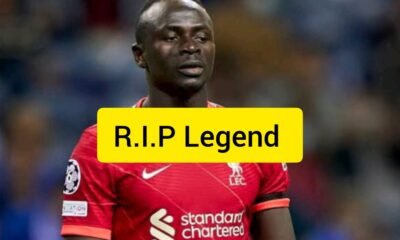
 Liverpool2 years ago
Liverpool2 years agoSad News Sadio Manè Confirmed Dead Today By Sky Sports Reporters, Open For Full Story 👇
-
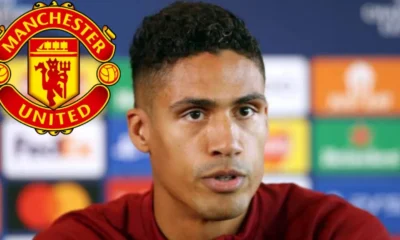
 Blog1 year ago
Blog1 year ago“I was forcefully removed from Manchester United squad and now I’ve joined the best team in the world…I will revenge and as a result, I’ve ordered my friend who’s their best player currently to leave there with immediate effect and he has agreed”: Former Man United player angered by United decision to removed him from the squad as he ordered the Club’s best player to leave immediately.
-

 Blog1 year ago
Blog1 year agoSad News: Manchester United player died when playing for his country England yesterday 😢 😔
-

 Blog2 years ago
Blog2 years agoR.I.P: Formal Real Madrid and France international confirm death this morning
-

 Chelsea2 years ago
Chelsea2 years agoBreaking New:”Roman Abramovich could get Chelsea back”? Chelsea owner review the conversation between him and Roman Abramovich in. Deal about getting Chelsea back
-

 Blog2 years ago
Blog2 years agoUNBELIEVABLE: Manchester City midfielder KELVIN DE BRUYNE divorced wife this morning after DNA test revealed their 5 years old son belongs to formal Manchester United player
-
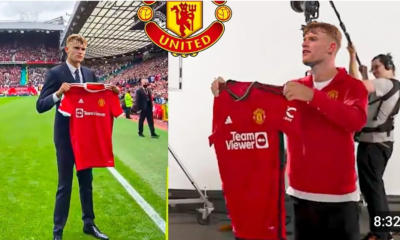
 Manchester United1 year ago
Manchester United1 year agoOFFICIAL NOW: Manchester United announce the signing of 23yr sensational player after beating Liverpool and Madrid for His signature, agreement reached on a 5yr deal, Medical completed – announcement ongoing



